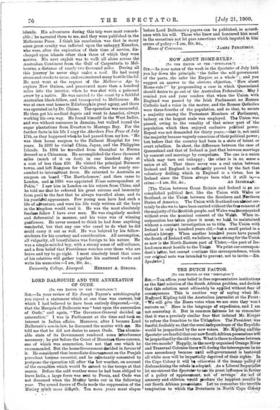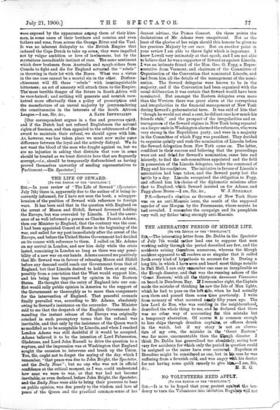THE DUTCH FACTOR.
[TO THE EDITOR OF THE " SPEOTAXOR.1 - - • Sta,—You affirm your belief in free representative -institutions as the final solution of the South African problem; and deck* that this solution must ultisnately be applied without fear 'of consequences. This is another Way of saying What- Mr. Rudyard Kipling told the Australian' journalist at- the Front: "We will give the Boers votes when we are Sure they 'Won't outvote us." Here is the language Of expedience, and I am not censuring it. But in commortfaiiness let as iemembei that it was a precisely similar fear that induced Mr.. King& to refuse the franchise to the Uitlanders.. The:President; was fearful, foolishly so, that the semi-iridependenee of thillepiiblie would be jeopardised by the new voters. *Mr: KIpling incrthe Spectator are fearful that our new South AfriCan possessions will be jeopardised by the old voters. What is there to.chotee betieen the two moods? Happily, in the newly organised Oringi-RiVer and Transvaal Colonies there will during the interreintinr.te race ascendancy because until self.governinent is -besteiied all white men will be impartially deprived of their...rights.... in the Cape Colony it will be otherwise if the: ineane 4;144 kit disfranchising the rebels iiadopted. ,As a 'Liberal IniPerialiSt lei me entreat the Speetater touie4,rent initnenee: fivirar . of a policy of appeasement, not. of revenge: • Arr..aci -of amnesty and oblivion would pi.Oduee the hatsqifs4n Out South African possessions. Let-us remember theteiTiSle temptation to 'which .the -Dutchmen inTITortli'eaPe Wont . . . . . . were exposed by the appearance ampng them of their kins- men, in some cases of their brothers and cousins, and even fathers and sons, from across the Orange River and the Vaal. It was no inherent disloyalty to the British Empire that induced the Cape Dutch to take up arms; they were impelled not by vulgar ambition or love of lawlessness, but by the mysterious ineradicable instinct of race. The same sentiment which drew buslunen from Australia and rough-riders from Canada to fight and die for England actuated the " rebels " in throwing in their lot with the Boers. What was a virtue in the one case cannot be a mortal sin in the other. Disfran- chisement will fill these " rebels " with inextinguishable bitterness; an act of amnesty will attach them to the Empire. The 'most terrible danger of the future in South Africa will be race-hatred; and nothing will generate and nourish race- hatred more effectually than a -policy of proscription and the manufacture of an unreal majority by jerrymandering the constituencies in the interests of the South African [Our correspondent argues in a fine and generoue gala, and if the Dutch had not refused Englishmen the natural rights of freemen, and then appealed to the arbitrament of the sword to maintain their refusal, we should agree with him. As, however, war has taken place we must now make some difference between the loyal and the actively disloyal. We do not want the blood of the men who fought against us, but we lee no injustice in asking that districts that rose in arms Should be treated as we treat districts here that are flagrantly oorrupt,—i.e., should be temporarily disfranchised as having proved themselves unworthy of sending representatives to Parliament.—ED. Spectator.] •



































 Previous page
Previous page